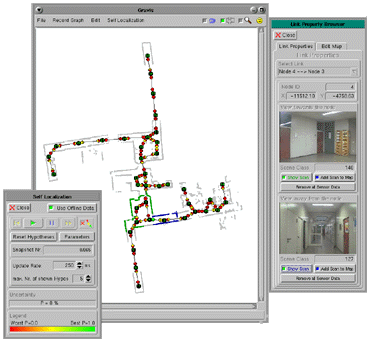![[Logo]](/aglogo.gif)

Phoenix Mobile Experimental Platform
Research Group Robotics & Process Control
Global Self-Localization:
Self-localization robustness and flexibility is essential for mobile robots in service applications, because:
- there is usually no opportunity to install beacons or artificial landmarks,
- the target environment might be temporarily crowded,
- the target environment might be partially mutable.
 The global localization technique developed in the CAROL-project bases on a hybrid topological/ metric world model, which preserves the basic advantages of both architectures:
The global localization technique developed in the CAROL-project bases on a hybrid topological/ metric world model, which preserves the basic advantages of both architectures:
- high local precision,
- simple path planning,
- simple (topological) map building,
- simple sensor data fusion,
- simple integration of non-metric sensor data.
The proposed localization technique integrates position information from many different sources, e. g. APR scan matching, visual scene classification, neural scan classification and optical detection of barcode labels.
Implementation: Lutz Franken
Publications:
Last modified: 09.03.01, Joachim Weber